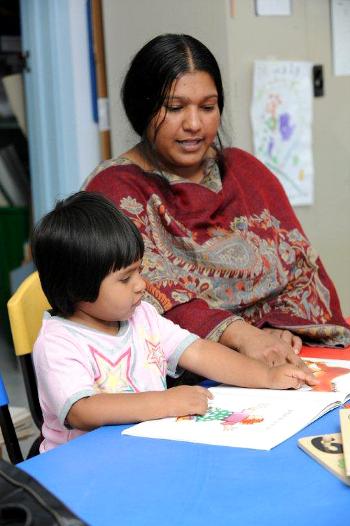But why?
Duration/age

Children are naturally inquisitive and want to know about the world and what is happening around them. The way they express their wonder and curiosity is by asking questions.
Your child might ask questions about what they see and hear or about where you are going.
Where does the sun go at night?
Next time your child has questions, listen, respond and ask your own questions. This sort of questioning and listening will help with language and listening skills. Sometimes giving a question instead of an answer will help them to problem-solve and think about why something might happen.
Why do horses wear shoes?
Materials you will need
- Your voice
- Your ears
Skills this activity improves
Why does this matter?
Children learn by asking questions. Listening, responding and asking questions helps your child to develop language and vocabulary.
As they ask questions they are learning to hold a conversation with another person and to use language that will extend the conversation. As they ask or listen to what is being said they are learning to process the information they hear and to use language that is related to that topic.
What does this lead to?
Asking questions helps your child to build creativity and to develop an understanding that there are many different ways that we can do things. As they ask questions they will be developing new knowledge and language.
Language to use
- Question, words, language, answer
- Inquire, research, problem, ponder
- How, where, why, when
Questions to use
- Why doesn’t the moon fall out of the sky?
- How do fish breathe under water?
- Why do we need to sleep?
- How does a mouse get inside the house?
- When do your teeth stop growing?
- Do bees see in colour?
Useful tips
- The blue book has information about language development and ages and stages.
- Try to use a mixture of open and closed questions. Open questions help to extend the conversation. Closed questions give the answer and stop the conversation.
- The activities Out and about on North Terrace, We went walking and On the tram have some great examples of questions to ask when out and about.
More ideas
- Stories and non-fiction books provide lots of opportunity to ask questions.
- Play I-spy.
Variation by age
Birth to two year olds
- Borrow books from the library that ask questions.
- Make a ‘feely’ bag. Ask your child questions as they try and work out what is inside.
- When you are out and about ask your child questions about what they can see or hear.
Three to five year olds
- Borrow books from the library that ask questions.
- Play the person guessing game. Take it in turns to ask questions until you guess. Try asking about things like what the person wears, what colour eyes they have, what they like to do.
- Hide something inside a box. Get your child to ask questions to try and work out what is inside.
Questions to ask
- Can you find something that is red?
- Can you find an animal that flies?
- Where do you put your shoes?
- What can you wear on your head?
- What noise does a cat make?
Questions to ask
- What do flowers need to grow?
- Do all birds fly?
- Do all 4 year olds have the same sized feet?
- Where do flies go when it rains?


